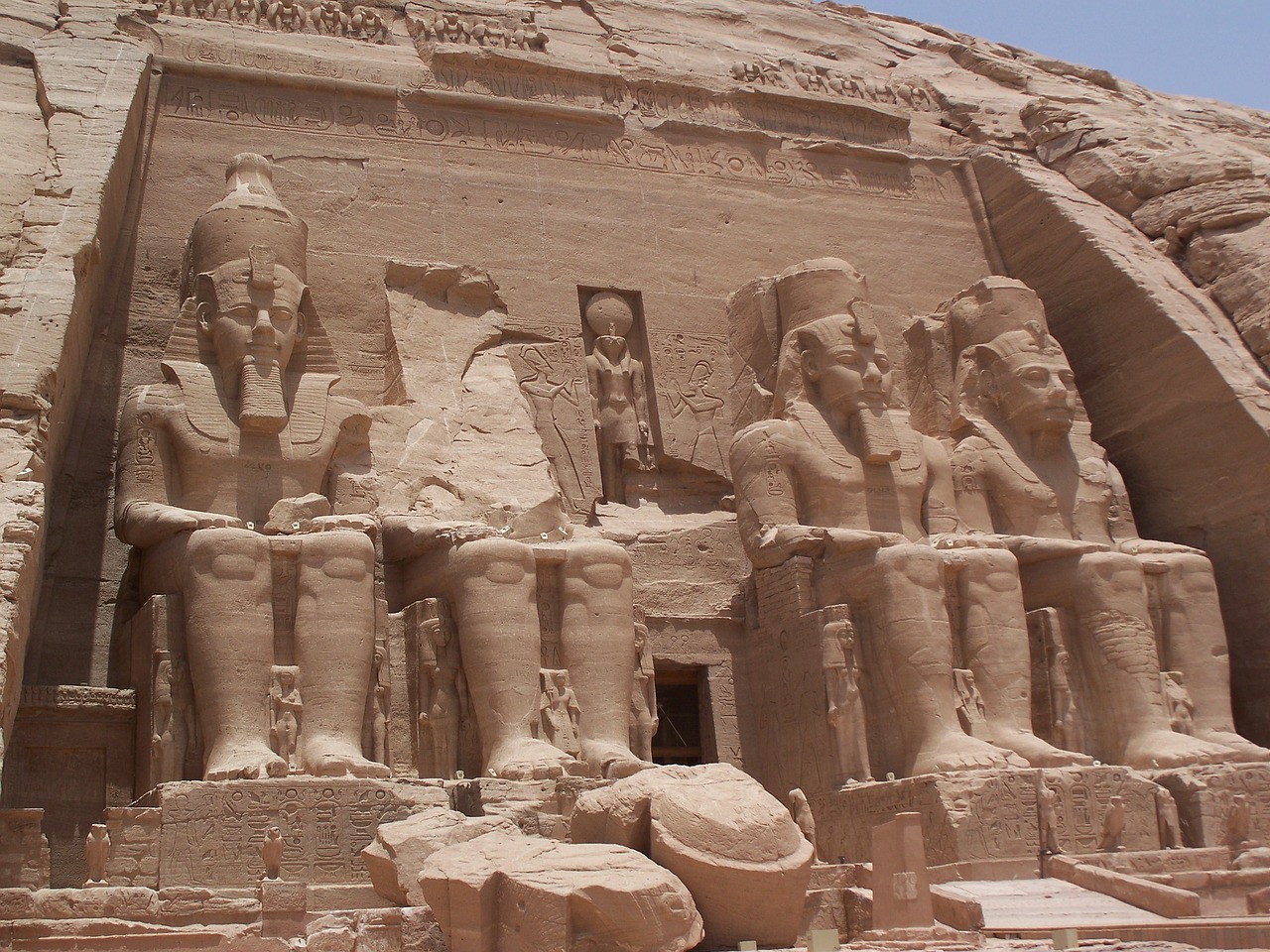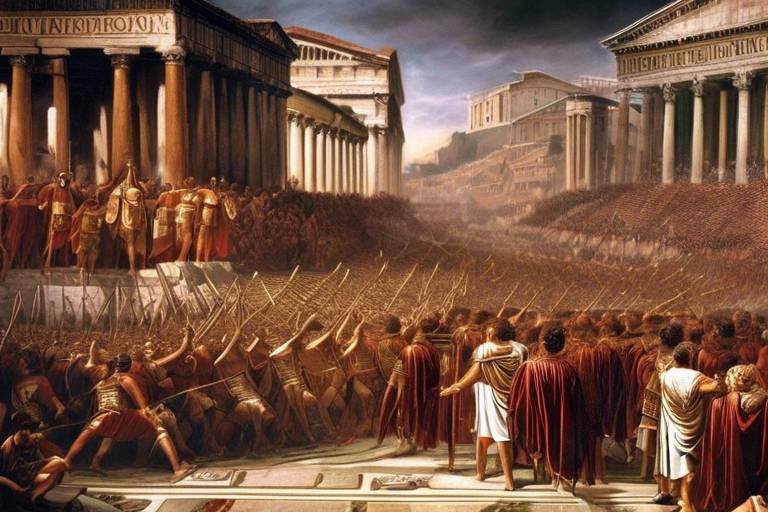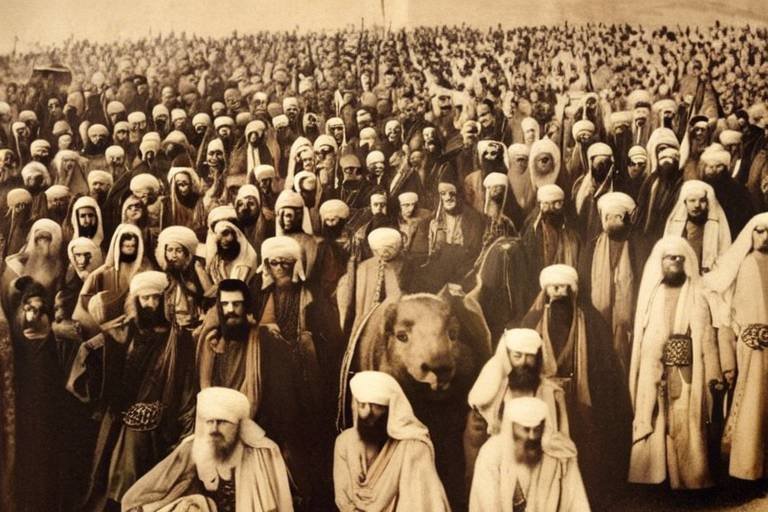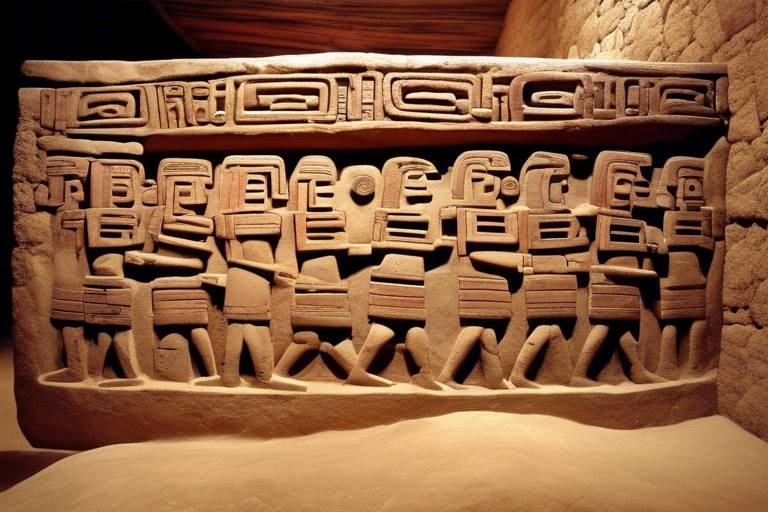The Cultural Exchange of Ancient African Kingdoms
The Cultural Exchange of Ancient African Kingdoms is a fascinating journey through time, delving into the rich tapestry of history woven by powerful civilizations on the African continent. These ancient kingdoms, such as Ghana, Mali, and Songhai, were not only centers of political power but also hubs of cultural exchange, trade, and artistic innovation.
As we explore the origins and development of these kingdoms, we uncover a world where political structures, economic prosperity, and military prowess shaped the course of history. The legacy of these civilizations continues to influence modern African societies, leaving a lasting imprint on the continent's cultural landscape.
One of the most intriguing aspects of ancient African kingdoms is their cultural interactions and trade networks. These networks connected distant regions, facilitating the exchange of goods, ideas, and technologies. The vibrant trade routes fostered a dynamic exchange of cultural practices, enriching the societies of the time.
Artistic expression and architectural marvels also played a significant role in shaping the identity of ancient African kingdoms. Intricate sculptures, vibrant textiles, and impressive monuments reflected the creativity and ingenuity of these civilizations. The sophisticated urban centers stood as testaments to the advanced architectural knowledge of the time.
Religious practices and belief systems were another crucial aspect of ancient African kingdoms. From indigenous spiritual traditions to the introduction of Islam and Christianity, the diverse religious landscape influenced societal norms and cultural practices. These belief systems continue to resonate in contemporary African societies.
Linguistic connections and oral traditions further highlight the richness of ancient African kingdoms. The development of languages, storytelling traditions, and communication methods played a vital role in preserving history and cultural heritage. These oral traditions served as the foundation for passing down knowledge from generation to generation.
The impact of cultural exchanges among ancient African kingdoms reverberates through the centuries, shaping the development of African societies. Governance systems, artistic expressions, religious beliefs, and societal norms bear the imprint of these ancient civilizations, underscoring the enduring legacy of their cultural exchange.
Through the exploration of the cultural exchange of ancient African kingdoms, we gain a deeper understanding of the interconnectedness of human history and the enduring influence of past civilizations on contemporary society.

Rich History of Ancient African Kingdoms
Topics to be discussed in the article include the rich history of ancient African kingdoms, their cultural interactions, trade networks, artistic influences, religious practices, linguistic connections, architectural marvels, and the impact of these exchanges on the development of African societies.
Ancient African kingdoms such as Ghana, Mali, and Songhai hold a rich history that shaped the continent's landscape. These powerful kingdoms were known for their sophisticated political structures, thriving economies, and remarkable military achievements. The rise and fall of these kingdoms left a lasting impact on Africa's historical narrative, influencing future generations and neighboring regions.
One of the most renowned kingdoms, Ghana, also known as the Wagadou Empire, flourished between the 8th and 11th centuries. It was a hub of trade and wealth, controlling the trans-Saharan trade routes and becoming a center of power and culture. Mali, the successor of Ghana, reached its peak under the leadership of Mansa Musa, known for his legendary pilgrimage to Mecca and the vast wealth of the empire. The Songhai Empire, the largest of the three, expanded its territory through military conquests and established a formidable presence in West Africa.
These kingdoms were not only influential in their military and economic prowess but also in their cultural achievements. They were centers of learning, attracting scholars, artists, and traders from far and wide. The legacy of these kingdoms continues to inspire African heritage and identity, showcasing the resilience and creativity of ancient African civilizations.
Exploring the history of these kingdoms offers a glimpse into the rich tapestry of Africa's past, highlighting the complexities of governance, the prosperity of trade, and the valor of warriors. Their stories resonate through time, reminding us of the enduring legacy of ancient African kingdoms in shaping the continent's history and culture.

Cultural Interactions and Trade Networks
Topics to be discussed in the article include the rich history of ancient African kingdoms, their cultural interactions, trade networks, artistic influences, religious practices, linguistic connections, architectural marvels, and the impact of these exchanges on the development of African societies.
Exploring the fascinating cultural interactions and extensive trade networks that flourished among ancient African kingdoms opens a window into a world of vibrant exchange and interconnectedness. These kingdoms were not isolated entities but rather bustling hubs of commerce and cultural fusion where goods, ideas, and innovations flowed freely.
The trade routes crisscrossing the African continent linked kingdoms like intricate threads in a rich tapestry, facilitating the exchange of precious commodities such as gold, ivory, salt, and slaves. These networks not only fueled economic prosperity but also served as conduits for the transmission of knowledge, technologies, and cultural practices.
Imagine the bustling markets where merchants from distant lands bartered their wares, each transaction a spark igniting the flames of cultural exchange. The sights, sounds, and smells of these vibrant trading centers would have been a sensory explosion, a testament to the diversity and richness of the interactions taking place.
Moreover, these trade networks were not just about the exchange of material goods but also served as conduits for the dissemination of ideas, beliefs, and artistic influences. The cultural tapestry woven through these interactions shaped the identities of the kingdoms involved, leaving a lasting imprint on their societies.
Through these interactions, ancient African kingdoms forged lasting connections with distant lands, creating a web of cultural exchange that transcended geographical boundaries. The legacy of these trade networks can still be seen in the shared artistic motifs, architectural styles, and religious practices that permeate the African continent.
- Q: How did trade networks impact the development of ancient African kingdoms?
- A: Trade networks played a crucial role in the economic prosperity and cultural enrichment of ancient African kingdoms. They facilitated the exchange of goods, ideas, and technologies, contributing to the growth and development of these societies.
- Q: What were some of the key commodities traded among ancient African kingdoms?
- A: Gold, ivory, salt, slaves, textiles, and spices were among the key commodities traded along the trade routes of ancient African kingdoms, reflecting the diverse economic activities and resources of the region.
- Q: How did cultural interactions shape the artistic expressions of ancient African kingdoms?
- A: Cultural interactions brought about a fusion of artistic styles, techniques, and motifs, leading to the creation of unique and innovative artistic expressions that reflected the diversity and creativity of the ancient African kingdoms.

Artistic Influences and Architectural Marvels
Topics to be discussed in the article include the rich history of ancient African kingdoms, their cultural interactions, trade networks, artistic influences, religious practices, linguistic connections, architectural marvels, and the impact of these exchanges on the development of African societies.
Art and architecture played a significant role in the cultural exchange of ancient African kingdoms, showcasing the creativity and skill of these civilizations. The artistic influences and architectural marvels of these kingdoms mesmerize historians and art enthusiasts alike, providing a glimpse into the rich heritage of Africa.
One of the remarkable aspects of artistic expression in ancient African kingdoms was the intricate sculptures crafted by skilled artisans. These sculptures, often depicting royalty, deities, or everyday life, reflected the cultural values and beliefs of the societies. The attention to detail and symbolism in these sculptures reveal the depth of artistic talent present in these kingdoms.
Furthermore, vibrant textiles were another hallmark of artistic influences in ancient African kingdoms. Textiles were not merely fabrics but intricate pieces of art, adorned with elaborate patterns and colors. These textiles served as a form of expression, conveying stories, traditions, and social status through their designs.
In addition to sculptures and textiles, ancient African kingdoms were known for their impressive architectural marvels. Monuments and structures such as the Great Mosque of Djenné in Mali or the Great Zimbabwe Ruins in Zimbabwe stand as testaments to the architectural prowess of these civilizations. These architectural wonders not only served practical purposes but also symbolized the power and grandeur of the kingdoms.
The sophisticated urban centers of ancient African kingdoms also reflected their architectural ingenuity. Cities like Timbuktu in Mali were hubs of trade, learning, and cultural exchange, boasting impressive buildings and infrastructure. These urban centers were not only economic and political capitals but also centers of artistic innovation and architectural beauty.
In conclusion, the artistic influences and architectural marvels of ancient African kingdoms are a testament to the creativity, craftsmanship, and cultural richness of these civilizations. Through their art and architecture, these kingdoms left a lasting legacy that continues to inspire and awe people around the world.
- What were the major artistic forms in ancient African kingdoms?
- How did architectural marvels contribute to the identity of these civilizations?
- What role did textiles play in the artistic expressions of ancient African societies?
- Which architectural wonders are considered iconic from ancient African kingdoms?

Religious Practices and Belief Systems
Topics to be discussed in the article include the rich history of ancient African kingdoms, their cultural interactions, trade networks, artistic influences, religious practices, linguistic connections, architectural marvels, and the impact of these exchanges on the development of African societies.
Religion played a significant role in the lives of ancient African kingdoms, shaping their beliefs, rituals, and societal structures. From the indigenous spiritual traditions rooted in nature worship to the later introduction of Islam and Christianity, the religious landscape of these kingdoms was diverse and dynamic.
The spiritual practices of ancient African societies were deeply intertwined with their daily lives, influencing everything from governance to social interactions. Rituals and ceremonies were conducted to honor ancestors, seek blessings from deities, and ensure prosperity for the community.
Islam and Christianity, introduced through trade and diplomatic relations, gradually found their place alongside traditional African religions. This syncretism led to the emergence of unique belief systems that blended elements of different faiths, creating a rich tapestry of spiritual expression.
Oral traditions played a crucial role in preserving and passing down religious teachings and myths from one generation to the next. Griots, storytellers, and spiritual leaders were responsible for transmitting the knowledge of the gods, spirits, and cosmology that formed the foundation of belief systems.
The architectural marvels of ancient African kingdoms often reflected their religious beliefs, with grand temples, shrines, and sacred sites serving as centers of worship and pilgrimage. These structures not only showcased the artistic and engineering prowess of the societies but also stood as testaments to their spiritual devotion.
Through the study of religious practices and belief systems in ancient African kingdoms, we gain insight into the spiritual worldviews, moral codes, and philosophical frameworks that guided the lives of these societies. The interplay between traditional, imported, and hybrid religions demonstrates the adaptability and resilience of African cultures in the face of external influences.
Coming soon...

Linguistic Connections and Oral Traditions
Topics to be discussed in the article include the rich history of ancient African kingdoms, their cultural interactions, trade networks, artistic influences, religious practices, linguistic connections, architectural marvels, and the impact of these exchanges on the development of African societies.
Exploring the linguistic diversity and oral traditions of ancient African kingdoms reveals a tapestry of communication methods and storytelling techniques that were intrinsic to their cultural identities. Languages served as a bridge between different communities, enabling the exchange of ideas, histories, and traditions. The oral tradition was a powerful tool for passing down knowledge from generation to generation, preserving the rich heritage of these kingdoms.

Impact on the Development of African Societies
The cultural exchange among ancient African kingdoms had a profound impact on the development of African societies, shaping various aspects of life on the continent. These interactions influenced not only the individual kingdoms involved but also the broader social, political, and economic landscape of Africa as a whole.
One significant impact of these exchanges was on governance systems. The sharing of political ideas and administrative practices among kingdoms led to the evolution of more sophisticated governance structures. Concepts of centralized authority, taxation, and diplomacy were exchanged and adapted, contributing to the development of more organized and stable societies.
Moreover, the artistic influences and architectural marvels exchanged between African kingdoms played a crucial role in shaping the visual identity of various societies. The intricate sculptures, vibrant textiles, and impressive monuments not only showcased the creativity and craftsmanship of the people but also served as symbols of cultural pride and heritage.
Religious practices and belief systems were also deeply influenced by these cultural exchanges. The introduction of Islam and Christianity, alongside indigenous spiritual traditions, led to a rich tapestry of religious diversity in African societies. These belief systems not only provided spiritual guidance but also influenced social norms, ethical values, and community cohesion.
Furthermore, the economic impact of trade networks and commercial interactions among African kingdoms cannot be understated. The exchange of goods, technologies, and resources fueled economic growth and prosperity, creating vibrant marketplaces and fostering specialization in various industries such as textiles, metalwork, and agriculture.
Lastly, the cultural exchanges among ancient African kingdoms contributed to the preservation and transmission of oral traditions and historical narratives. Through storytelling, music, and dance, communities passed down knowledge, wisdom, and collective memories from generation to generation, ensuring the continuity of cultural heritage and identity.
Frequently Asked Questions
- What were some of the most powerful ancient African kingdoms?
Ancient African history is rich with powerful kingdoms such as Ghana, Mali, and Songhai. These kingdoms were known for their advanced political structures, economic prosperity, and military achievements that left a lasting impact on the continent.
- How did cultural interactions and trade networks shape ancient African societies?
Cultural interactions and trade networks played a crucial role in connecting ancient African kingdoms with other regions. These exchanges facilitated the sharing of goods, ideas, technologies, and traditions, contributing to the enrichment and development of African societies.
- What were some notable artistic influences and architectural marvels of ancient African kingdoms?
Ancient African kingdoms showcased impressive artistic expressions and architectural wonders, including intricate sculptures, vibrant textiles, monumental structures, and sophisticated urban centers. These marvels highlighted the creativity and ingenuity of these societies.
- How did religious practices and belief systems vary among ancient African kingdoms?
Ancient African kingdoms exhibited diverse religious practices and belief systems, ranging from indigenous spiritual traditions to the adoption of Islam and Christianity. These beliefs had a significant impact on the social and cultural fabric of these societies.
- What role did linguistic connections and oral traditions play in ancient African kingdoms?
Linguistic diversity and oral traditions were integral to the identity of ancient African kingdoms. The development of languages, storytelling, and communication methods served as vital tools for preserving history and cultural heritage within these societies.
- How did cultural exchanges among ancient African kingdoms influence the development of African societies?
The cultural exchanges among ancient African kingdoms had a lasting impact on the social, political, and economic development of the continent. These exchanges influenced governance systems, artistic expressions, religious beliefs, and societal norms, shaping the course of African history.


















